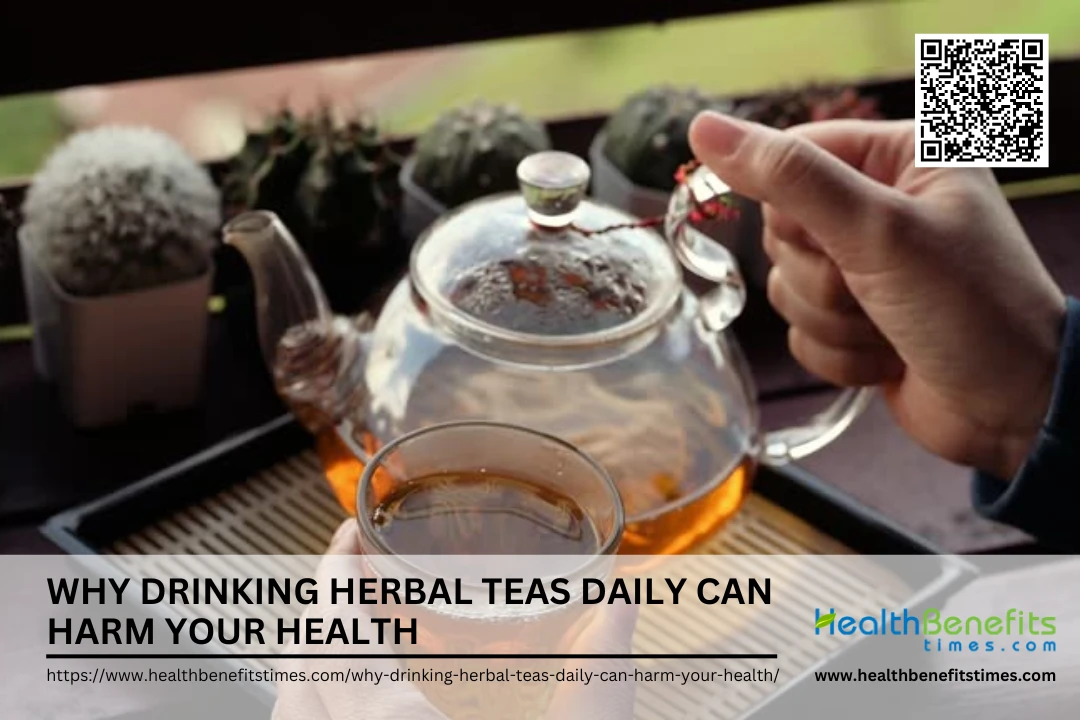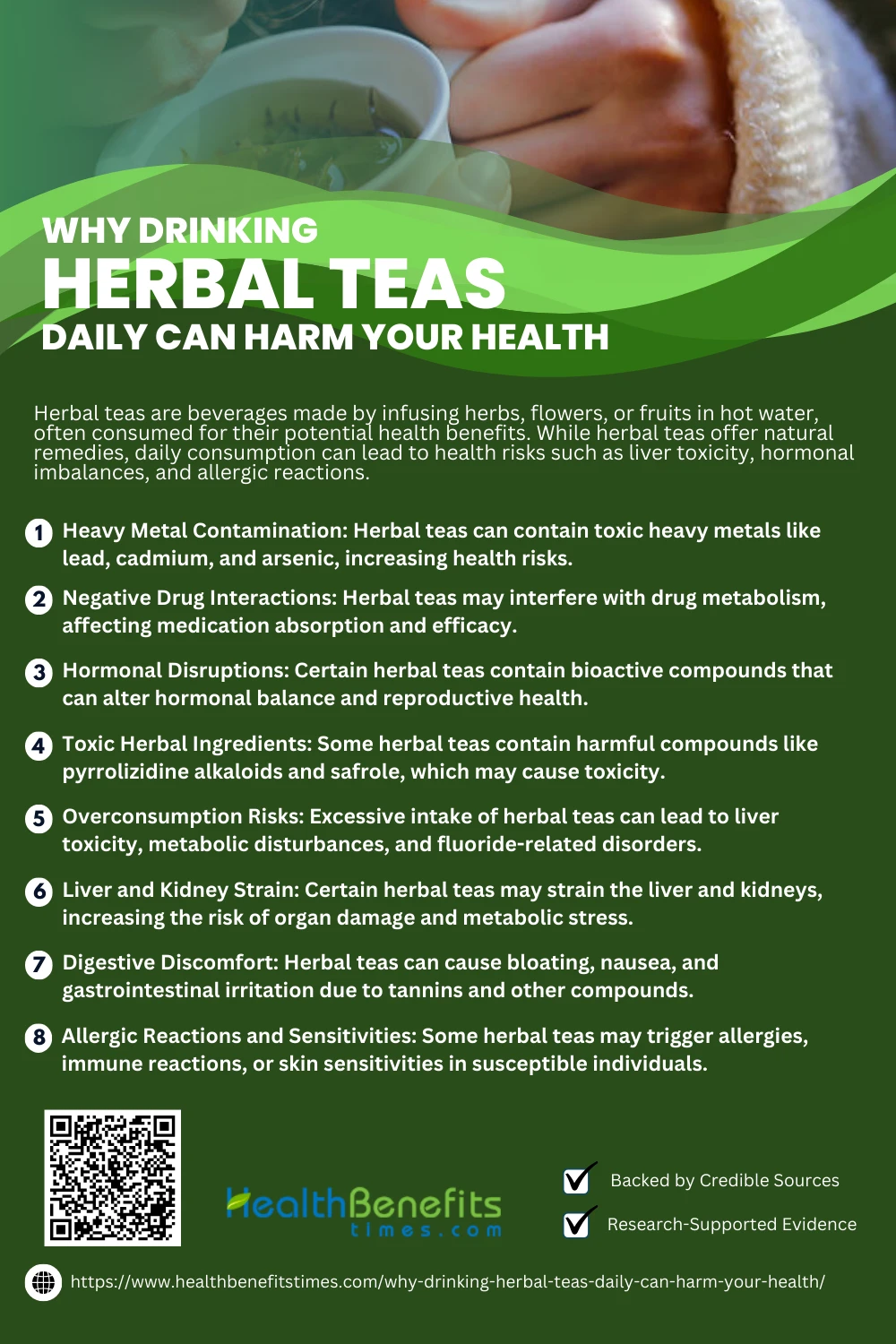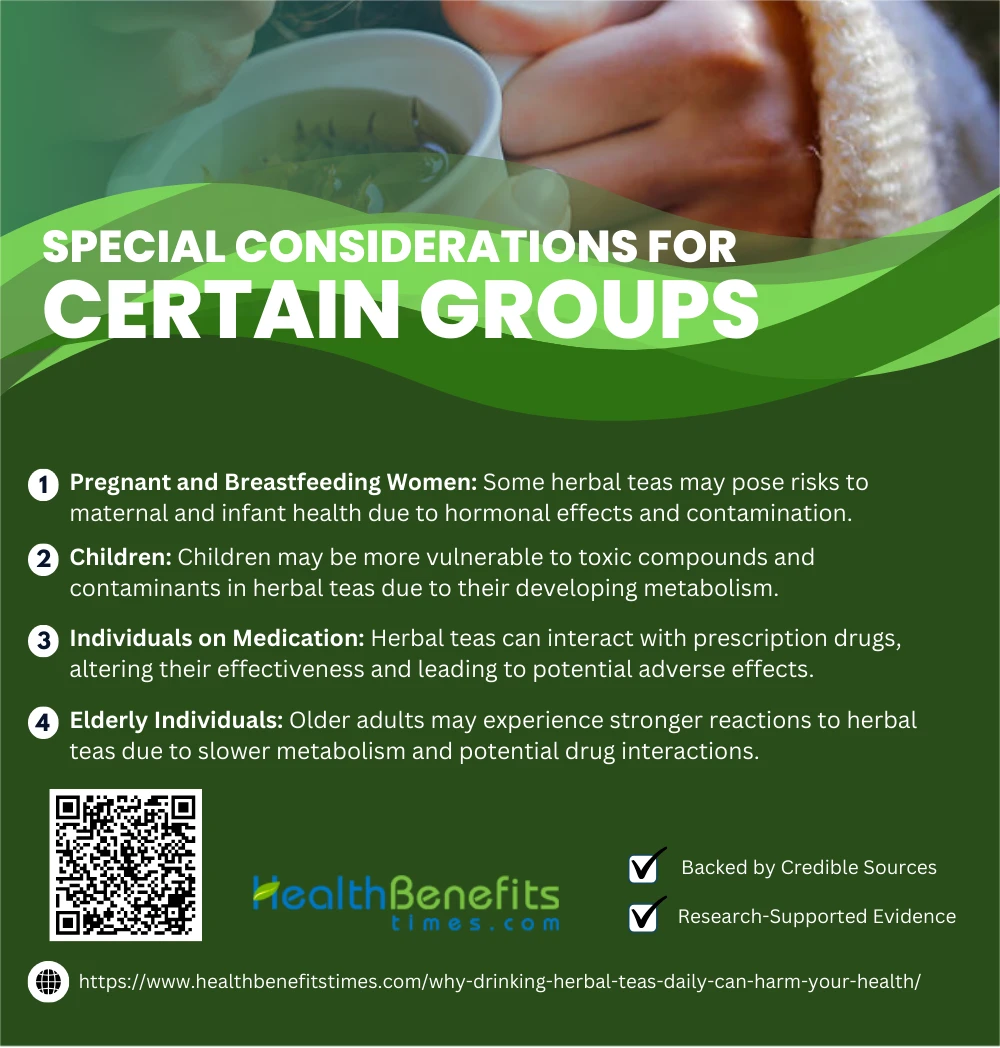- Herbal teas are beverages made by infusing herbs, flowers, or fruits in hot water, often consumed for their potential health benefits.
- While herbal teas offer natural remedies, daily consumption can lead to health risks such as liver toxicity, hormonal imbalances, and allergic reactions.
- Certain herbs may interact with medications, and contaminants like heavy metals or pesticides in unregulated teas can pose long-term health concerns.
 Herbal teas are beverages made by steeping various plant materials such as leaves, flowers, seeds, or roots in hot water, often used for their purported medicinal benefits. (1) While widely considered a natural and health-boosting alternative to traditional teas, daily consumption of herbal teas can pose significant health risks that many consumers are unaware of. Studies have found that certain herbal teas contain toxic metals and contaminants, which, when consumed in excess, may exceed safe levels of daily intake and contribute to heavy metal accumulation in the body. (2) Additionally, herbal infusions can interact with medications and impair liver function, raising concerns about their widespread and unchecked use. (3)
Herbal teas are beverages made by steeping various plant materials such as leaves, flowers, seeds, or roots in hot water, often used for their purported medicinal benefits. (1) While widely considered a natural and health-boosting alternative to traditional teas, daily consumption of herbal teas can pose significant health risks that many consumers are unaware of. Studies have found that certain herbal teas contain toxic metals and contaminants, which, when consumed in excess, may exceed safe levels of daily intake and contribute to heavy metal accumulation in the body. (2) Additionally, herbal infusions can interact with medications and impair liver function, raising concerns about their widespread and unchecked use. (3)
Beyond toxicity, research indicates that specific herbs, such as licorice root and rhubarb root, may cause hormonal imbalances and negatively impact metabolic health when ingested regularly. (4) Some herbal teas also contain high fluoride levels, which can contribute to long-term dental and skeletal fluorosis. (5) Furthermore, pregnant women and individuals with underlying conditions should be especially cautious, as some herbal teas can lead to adverse effects such as increased blood pressure, gastrointestinal distress, or allergic reactions.(6)
Recent studies have also raised concerns about nanoparticle exposure from herbal tea infusions, particularly regarding their potential to disrupt gut microbiota and cause cellular damage. (1) Additionally, long-term daily intake of herbal teas may contribute to oxidative stress, which is linked to the development of chronic diseases such as cardiovascular disorders and type 2 diabetes. (7) Given these emerging risks, it is crucial to reevaluate the perception of herbal teas as a universally safe health beverage and consider moderation and proper selection of herbal products. (8)
The Hidden Dangers of Herbal Teas
Herbal teas are often seen as a natural health booster, but daily consumption can pose hidden risks, including toxicity, medication interactions, and unexpected side effects.
1. Heavy Metal Contamination
Herbal teas can contain hazardous levels of heavy metals, including lead, cadmium, and arsenic, posing significant health risks. (9) Studies reveal high metal concentrations in tea leaves, particularly from regions with contaminated soil. (10) The presence of mercury and aluminum further exacerbates toxicity concerns in long-term consumers. (11) Some research suggests that initial tea infusions contain the highest concentration of metals, highlighting the importance of discarding the first brew. (12) Monitoring and stricter regulations are needed to minimize heavy metal exposure in herbal tea consumers. (13)
2. Negative Drug Interactions
Herbal teas can interfere with drug metabolism, leading to adverse effects by altering enzyme activity responsible for drug breakdown. (14) Some herbal components inhibit or induce cytochrome P450 enzymes, affecting drug absorption and efficacy. (15) Green and black tea polyphenols, for example, can alter the bioavailability of medications, potentially reducing their therapeutic effects. (16) The concurrent use of herbal teas with prescribed drugs may lead to significant pharmacodynamic and pharmacokinetic interactions, increasing toxicity risks. (17) Regular consumption of herbal teas should be carefully monitored to avoid severe herb-drug interactions in clinical settings. (18)
3. Hormonal Disruptions
Certain herbal teas contain bioactive compounds that can disrupt hormonal balance by interfering with endocrine signaling pathways. (19) Phytoestrogens present in some teas mimic estrogen, potentially leading to reproductive and metabolic disturbances. (20) Additionally, herbal remedies have been linked to polycystic ovary syndrome (PCOS) symptoms and fluctuations in estrogen and androgen levels. (21) Some herbs, including those used in lactation-supporting teas, may interfere with the hypothalamus-pituitary-thyroid axis, altering thyroid hormone regulation. (22) Further, endocrine-disrupting compounds in herbal teas can impact female reproductive health by modifying hormone receptor activity. (23)
4. Toxic Herbal Ingredients
Herbal teas may contain toxic ingredients such as pyrrolizidine alkaloids, which pose severe health risks, including liver toxicity and potential carcinogenic effects. (24) Certain herbal teas also accumulate heavy metals, increasing the risk of chronic toxicity upon prolonged consumption. (9) Fluoride contamination in herbal teas has been linked to bone and dental disorders due to excessive intake. (25) Additionally, some herbs contain safrole, a compound associated with liver damage and classified as a potential carcinogen. (26) Monitoring for toxic compounds in herbal teas is essential to mitigate health risks associated with their consumption. (27)
5. Overconsumption Risks
Overconsumption of herbal teas can lead to severe health risks, including liver toxicity and metabolic disturbances. (28) Excessive intake of tannin-rich teas has been linked to an increased risk of esophageal and oral cancer. (29) Some herbal teas contain high fluoride levels, which may contribute to skeletal fluorosis when consumed in large quantities. (25) The presence of caffeine and other stimulants in some herbal infusions can cause cardiovascular and neurological disturbances. (30) Monitoring tea intake is essential to avoid potential toxicity from bioactive compounds. (31)
6. Liver and Kidney Strain
Certain herbal teas may strain the liver and kidneys due to toxic compounds, leading to organ damage and metabolic stress. (32) Green tea extracts have been associated with acute liver failure, particularly in excessive or long-term consumption. (33) Some herbs, including those used in traditional medicine, have been linked to kidney toxicity, increasing the risk of renal failure. (34) Studies also indicate that chronic use of certain herbal supplements may contribute to hepatic inflammation and dysfunction. (35) Additionally, aristolochic acid-containing herbs have been directly implicated in chronic kidney disease and organ fibrosis. (36)
7. Digestive discomfort
Certain herbal teas may cause digestive discomfort, including bloating, nausea, and acid reflux due to their bioactive compounds. (26) Some teas interfere with protein digestion and may lead to gastrointestinal distress, especially in individuals with sensitive stomachs. (37) Herbal teas high in tannins can contribute to digestive irritation and disrupt gut microbiota balance. (31) Excessive consumption has been linked to increased risks of gastrointestinal cancers, suggesting potential long-term digestive health implications. (38) Additionally, some herbal teas contain natural laxatives that, when consumed frequently, can cause dependency and digestive irregularities. (39)
8. Allergic Reactions and Sensitivities
Herbal teas can trigger allergic reactions and sensitivities, especially in individuals prone to plant-based allergens. Chamomile and arnica, commonly found in herbal blends, have been linked to contact dermatitis and hypersensitivity responses. (40) Pyrrolizidine alkaloids present in certain herbal infusions may also provoke acute immune reactions and pose long-term toxicity risks. (41) Symptoms of herbal tea-related sensitivities include nausea, vomiting, and dermal irritation, emphasizing the need for careful selection. (42) Herbal teas containing Scutellaria (skullcap) have demonstrated histamine-induced allergic reactions in some individuals, further complicating their safety profile. (43) Additionally, green tea catechins have been associated with adverse immune responses, varying based on individual sensitivity. (44)
Special Considerations for Certain Groups
Herbal teas are generally considered safe for most individuals; however, certain groups should exercise caution:
1. Pregnant and Breastfeeding Women
The consumption of herbal teas during pregnancy and breastfeeding requires careful consideration, as certain herbs may pose risks to maternal and infant health. Some herbal supplements used in teas, such as fenugreek and fennel, are commonly consumed to support lactation, yet their safety profiles remain uncertain. (45) Many breastfeeding women have high confidence in the safety of herbal teas, yet evidence suggests potential concerns regarding contamination and bioactive compounds affecting infants. (46) Some herbs, such as licorice root and peppermint, have been linked to hormonal disturbances and should be avoided. (47) Traditional Chinese herbal medicines, often included in herbal teas, have raised concerns regarding their safety during pregnancy and lactation due to insufficient regulation. (48) Additionally, some herbal agents have been found to transfer into breast milk, potentially affecting infant development. (49)
2. Children
Herbal teas may pose risks to children due to differences in metabolism and sensitivity to certain bioactive compounds. The assumption that herbal products are inherently safe for children is misleading, as some contain potentially toxic ingredients. (50) There are concerns about the safety and efficacy of herbal teas in pediatric populations, particularly for children with chronic conditions. (51) Differences in how children absorb and metabolize herbal compounds may lead to unexpected effects, requiring careful monitoring. (52) Some herbal teas may also contain pyrrolizidine alkaloids, which pose significant health risks for toddlers and young children consuming herbal infusions regularly. (41) Additionally, contaminants such as heavy metals in herbal teas can exceed safe levels for children, posing long-term health concerns. (53)
3. Individuals on Medication
Individuals on medication should exercise caution when consuming herbal teas, as certain compounds may interact with prescription drugs, leading to altered efficacy or adverse effects. Some herbal ingredients, such as St. John’s Wort, have been found to interfere with drug metabolism, potentially reducing or enhancing the effects of medications. (54) Many individuals assume herbal medicines are safe; however, studies indicate significant drug interactions that may lead to toxicological risks. (55) Some herbal supplements can also interact with drug transporters like OATP2B1, altering the bioavailability of certain drugs. (56) Herbal teas may also impact liver enzyme activity, influencing how the body processes medications and potentially leading to serious clinical consequences. (17) Additionally, certain herbal compounds have been reported to interact with analgesic drugs, raising safety concerns for patients using pain management therapies. (57)
4. Elderly Individuals
Elderly individuals should be cautious when consuming herbal teas due to potential safety concerns, including drug interactions, altered metabolism, and contamination risks. Cases of intoxication have been reported following herbal tea consumption, raising concerns about product safety for older adults. (32) Aging affects metabolism, making elderly individuals more vulnerable to adverse reactions from herbal ingredients commonly found in teas. (52) Studies highlight that microbial contamination in herbal medicines can pose serious health hazards for elderly consumers, who may have compromised immune systems. (58) Additionally, some herbal teas contain bioactive compounds that may interact with medications, leading to unintended side effects. (59) Safety evaluations indicate that excessive green tea-based supplements have been associated with liver toxicity in vulnerable populations, including older adults. (31)
How to Consume Herbal Teas Safely
To safely consume herbal teas, ensure they are sourced from reputable brands with quality assurance measures in place to avoid contamination. (59) Regular intake should be moderated to prevent excessive exposure to trace elements and potential toxins. (60) Some herbal infusions contain pyrrolizidine alkaloids, which may pose health risks if consumed frequently. (41) Additionally, consumers should follow traditional preparation guidelines to ensure the maximum safety and efficacy of herbal remedies. (61) Lastly, individuals on medication should consult healthcare providers before consuming herbal teas, as interactions with pharmaceuticals are possible. (31)
Myth vs. Reality: Are Herbal Teas Truly Safe?
Herbal teas are often perceived as natural and safe, but this is not always the case.
- Myth: Herbal Teas Are Always Safe Because They Are Natural
Reality: Not all herbal teas are safe; some herbs can have toxic or allergenic effects. For example, comfrey contains alkaloids that may be harmful to the liver and is not recommended for oral use.
- Myth: Herbal Teas Have No Side Effects
Reality: Some herbal teas can cause adverse effects. For instance, lobelia, used in some teas, may cause nausea, vomiting, or dizziness at high doses.
- Myth: Herbal Teas Do Not Interact with Medications
Reality: Certain herbal teas can interact with medications. For example, St. John’s wort, commonly consumed as an herbal tea, can interact with various drugs.
- Myth: Herbal Teas Are Safe for Everyone
Reality: Some herbal teas may not be safe for certain individuals. For example, comfrey is not recommended during pregnancy or when prescription drugs are used.
- Myth: Herbal Teas Are Free from Contaminants
Reality: Herbal teas can be contaminated with pesticides or heavy metals, depending on their source. It’s important to choose products from reputable sources to minimize these risks.
Conclusion
While herbal teas are often praised for their potential health benefits, drinking them daily can pose unexpected risks. Overconsumption may lead to adverse effects such as liver toxicity, hormonal imbalances, allergic reactions, or interactions with medications. Certain herbs contain potent compounds that, when consumed excessively, can disrupt bodily functions rather than support them. Additionally, contaminants like heavy metals, pesticides, or unregulated additives in some herbal teas can pose long-term health risks. Moderation and awareness of ingredients are key to enjoying herbal teas safely. Consulting a healthcare professional before making them a daily habit ensures they complement rather than compromise your health.




